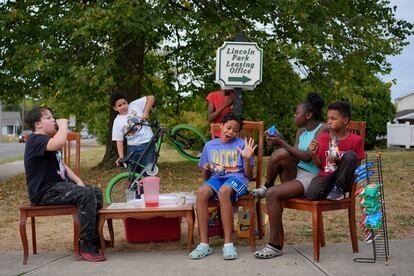Springfield doesn’t want to be in the news: Trump promises to visit while its Republican mayor hopes he won’t
The small Ohio town has received more than 30 bomb threats since the former president began spreading lies about its Haitian immigrant community


All roads lead to Springfield. At least for Donald Trump and J.D. Vance, who in recent weeks have made the Ohio town the focus of their anti-immigrant rhetoric and, by extension, their campaign. Their repeated false claims that the local Haitian immigrant population is eating their neighbors’ pets have done so much damage that local authorities have received more than 30 bomb threats and the mayor, the Republican Rob Rue, says he would rather not have Trump visit the town. But the Republican nominee insists he will go.
“I’m going there in the next two weeks. I’m going to Springfield,” he said Wednesday during a rally in New York. “You may never see me again, but that’s OK. Got to do what I got to do...Whatever happened to Trump?’ ‘Well, he never got out of Springfield,’” he added, suggesting that his life was in danger.
The former president was speaking just a day after Mayor Rue said a Trump visit would be “an extreme strain” on the city’s resources. “So it’d be fine with me if they decided not to make that visit,” he said on Tuesday. Ohio Governor Mike DeWine, a fellow Republican, echoed this sentiment, saying during the same press conference that while a Trump visit would be “generally very, very welcome,” it would pose security challenges. “I have to tell you the reality: We’re stretched thin here, and that’s a fact. We’re focused on getting kids back to school,” he said.
DeWine was referring to the fact that many Springfield parents are worried about sending their children to school after at least 33 bomb threats were reported at high schools and other locations in the city, including City Hall, in the past two weeks. Although all of the threats have been false alarms, they have prompted numerous evacuations and temporary closures of schools and municipal buildings, contributing to fear among the 60,000 residents of this small town, which has welcomed nearly 20,000 immigrants in the past four years, many of them Haitians.
Both Rue and DeWine, along with local officials, have attempted to debunk the Trump-Vance campaign’s lies about the Haitian community in Springfield, though apparently without success. City police have said there are “no credible reports” of Haitian immigrants harming domestic animals, and the mayor, in interviews with several media outlets, has called for an end to the hate against this community. Speaking to The New York Times, Rue said his city “is hurting” and that “It’s frustrating when national politicians, on the national stage, mischaracterize what is actually going on and misrepresent our community.” The mayor added that he regretted that the Haitian community had to “endure this kind of hate.”
Gov. DeWine went a step further, calling the hoax “a piece of garbage,” though he stopped short of directly condemning Trump or Vance. “There’s a lot of garbage on the internet and, you know, this is a piece of garbage that was simply not true. There’s no evidence of this at all,” he said in an interview with ABC News.

“I will continue to call them illegal”
In the same interview with ABC News, which aired Sunday, DeWine added that while the arrival of thousands of people since 2020 has brought some “challenges,” Springfield’s Haitian residents are there legally and are benefiting the city economically. “What the companies tell us is that they are very good workers. They’re very happy to have them there, and frankly, that’s helped the economy,” he continued.
Most Haitian immigrants are in the country legally through the temporary protected status, or TPS, program, which allows people from countries designated by the Department of Homeland Security to legally live and work in the United States for 18 months, a period that the department can renew indefinitely. TPS does not include a path to permanent residency or citizenship.
The Obama administration granted this protection to Haitians living illegally in the United States in 2010, and the Biden administration renewed it last June.

Despite these facts, both Trump and Vance insist that immigrants in Springfield are not only stealing and eating their neighbors’ pets, but should also be deported because, they claim, they are in the country illegally. In fact, last week Trump said his plan to carry out the “largest deportation” in U.S. history would begin in Springfield.
And Vance said Wednesday that he will continue to call the Haitian residents of Springfield “illegal aliens” even if they are not. “If Kamala Harris waves the wand illegally and says these people are now here legally, I’m still going to call them an illegal alien,” the vice presidential candidate said in response to a reporter’s question after a rally in Raleigh, North Carolina. “An illegal action from Kamala Harris does not make an alien legal.”
Trump has long been critical of the TPS program, even going so far as to try to end it during his presidency. Now, his running mate is echoing those criticisms, saying the program is illegal. It is not.
Sign up for our weekly newsletter to get more English-language news coverage from EL PAÍS USA Edition
Tu suscripción se está usando en otro dispositivo
¿Quieres añadir otro usuario a tu suscripción?
Si continúas leyendo en este dispositivo, no se podrá leer en el otro.
FlechaTu suscripción se está usando en otro dispositivo y solo puedes acceder a EL PAÍS desde un dispositivo a la vez.
Si quieres compartir tu cuenta, cambia tu suscripción a la modalidad Premium, así podrás añadir otro usuario. Cada uno accederá con su propia cuenta de email, lo que os permitirá personalizar vuestra experiencia en EL PAÍS.
¿Tienes una suscripción de empresa? Accede aquí para contratar más cuentas.
En el caso de no saber quién está usando tu cuenta, te recomendamos cambiar tu contraseña aquí.
Si decides continuar compartiendo tu cuenta, este mensaje se mostrará en tu dispositivo y en el de la otra persona que está usando tu cuenta de forma indefinida, afectando a tu experiencia de lectura. Puedes consultar aquí los términos y condiciones de la suscripción digital.








































